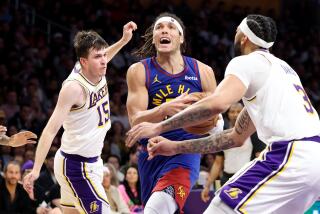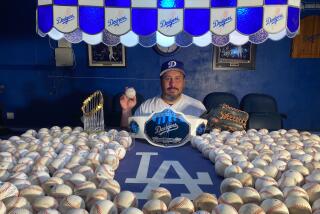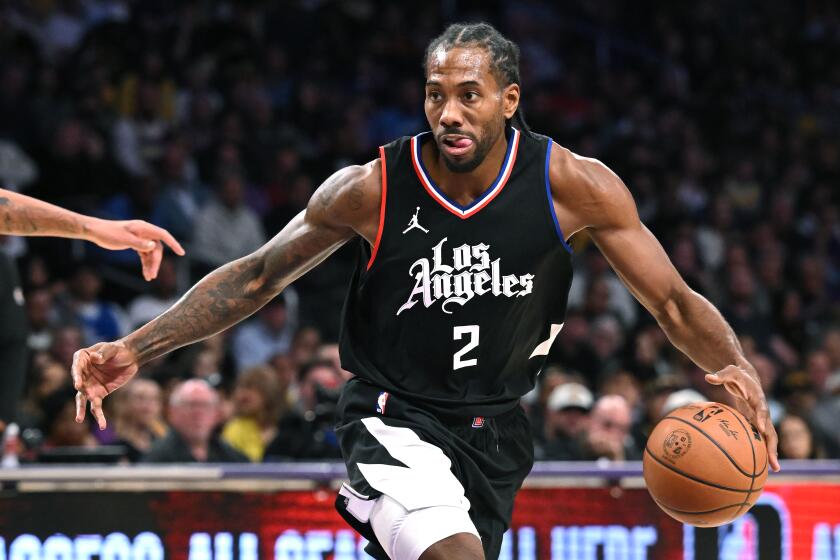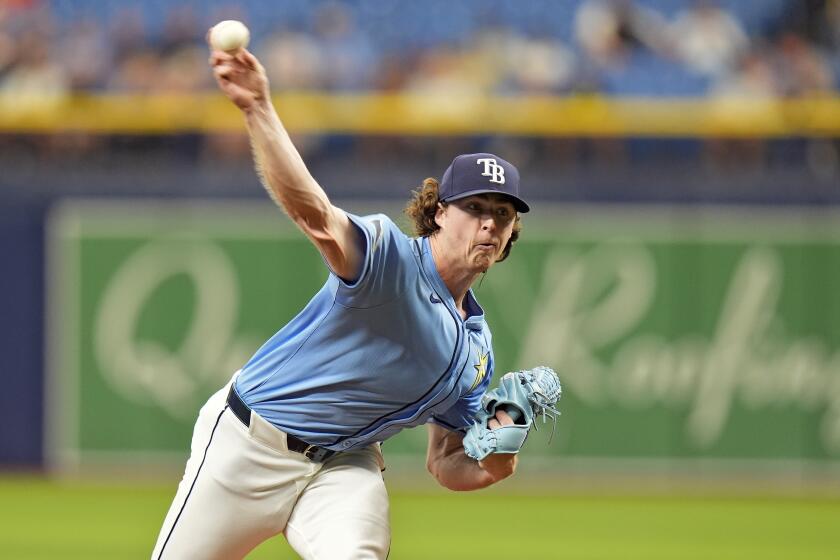Baseball MVP Awards Free of Statistic Cling
There’s no baseball rhubarb like a most valuable player rhubarb, so thanks to the Baseball Writers Assn. of America this week for giving us two for the price of one.
Mo Vaughn over 50-home run, 50-double man Albert Belle?
Barry Larkin over Triple Crown almost-achiever Dante Bichette?
In the wake of two of the dullest Cy Young Award elections in memory--Greg Maddux, Randy Johnson, why bother to even vote?--this year’s MVP balloting has been all kinds of fun, causing nostrils to flare, fingers to jab, Bichette to grouse to anyone who will listen and Belle to hang up on anyone bold enough to phone him.
It has also cut the rotisserie league decimal freaks completely adrift from their mooring, leaving them to doubt the very essence of their existence, because STATISTICS decreed landslide victories for Belle and Bichette, but STATISTICS were rebuked in both cases, and if STATISTICS can no longer be trusted, is there any reason to go on wasting beautiful summer days computing the hits/walks-to-innings-pitched ratio for Steve Trachsel?
Yes, this has been a good week for baseball.
The right people won the MVP plaques, maybe not for all the right reasons, but at the end of the day, results are what matter, no?
Maybe Bichette hit 25 more home runs and drove in 62 more runs than Larkin last season.
Larkin was more valuable to his team.
Maybe Vaughn was more likable than Belle, a better interview than Belle, a better citizen than Belle, a nicer guy who may have been easier to vote for than Belle.
He was also more valuable to his team, straight and simple, with or without consideration for raging personality disorders.
What it comes down to, again, as always, is the definition of the award.
It is not the Best Player award.
It is not the Best Slugger award.
It is not the First One To 50 Home Runs award, or the Best Performance In High Altitude For An Extended Period Of Time award, which someone needs to explain to Belle and Bichette.
The exact wording is “most valuable.” What that means, precisely, has been open to debate for most of this century, because value is in the eye of the beholder--especially so when the beholder is a card-carrying member of the BBWAA and armed with an MVP ballot.
“Most valuable” is about as subjective as it gets. Is a relief pitcher who saves 46 games more valuable than a clean-up man with 100 extra-base hits? Is a dependable shortstop who steals bases and keeps a division-winning infield from falling apart down the stretch more valuable than a left fielder who leads his league in home runs and RBIs?
The best formula, I believe, is the one Cleveland Manager Mike Hargrove attempted to discount after Belle fell eight points short of Vaughn in the American League voting. “The thing I keep hearing all the time,” Hargrove said, “is that if you take Albert out of our lineup and Vaughn out of Boston’s lineup, they’d be hurt more than us, but I don’t think that holds water. It’s just people trying to justify their vote.”
Actually, that rationale does hold water. It floats. It’s water-tight.
Take Belle out of Cleveland’s lineup and what do you have? Kenny Lofton, Jim Thome, Eddie Murray, Manny Ramirez, Paul Sorrento. So the Indians don’t go 100-44. They go 90-54 and win the AL Central title by only 20 games instead of 30.
Take Vaughn and his 126 RBIs and 39 home runs out of Boston’s lineup and the Red Sox, who held off the Yankees to win the AL East, probably finish third. If Vaughn doesn’t hit, the Red Sox are down to Jose Canseco, and when both of them don’t hit, the Red Sox get swept, three games and out of the playoffs, by the Indians.
Larkin’s presence was just as important to the Cincinnati Reds, who didn’t have as good a lineup as the Dodgers, but finished 10 games better than the Dodgers--if you count the playoff sweep. As even Bichette’s manager, Don Baylor, had to admit, Larkin is “at the center of almost everything that happens with that team.”
Bichette? He hit a lot of balls into the jet stream at Coors Field. So did Vinny Castilla. If Belle played half his games at Coors Canaveral, he might have hit 70 home runs and rendered the AL MVP argument moot.
Then again . . .
Belle’s loutish behavior hurt him in the voting, without question, since the voting is done by many of the same writers Belle curses, threatens or, on a good day, ignores on a regular basis. Writers are human, too--I can produce scientific evidence, if you insist--and revenge is among the oldest of all human foibles, be the weapon a knife in the back or a ballot in the mailbox. For several Belle bashers (bashees?), the MVP election was payback time.
Is that wrong?
In a perfect world, yes. But, again, consider the small print: Among the qualities MVP voters are asked to consider are “general character” and “disposition.” Belle goes 0-for-2 with those plate appearances. But that alone shouldn’t have, and probably didn’t, cost him the award. Historically, louts have fared well in these annual tabulations. Kirk Gibson was MVP in 1988. Barry Bonds won the award three times. George Bell, Jim Rice, Mike Schmidt--you can make a pretty respectable all-time baseball writers enemies list from the names of previous MVP winners.
This year, as with most, the most valuable players in both leagues fit the description. By chance, Vaughn and Larkin also happen to be decent guys.
Occasionally in baseball, “valuable” and “likable” are not mutually exclusive terms.
More to Read
Get our high school sports newsletter
Prep Rally is devoted to the SoCal high school sports experience, bringing you scores, stories and a behind-the-scenes look at what makes prep sports so popular.
You may occasionally receive promotional content from the Los Angeles Times.






